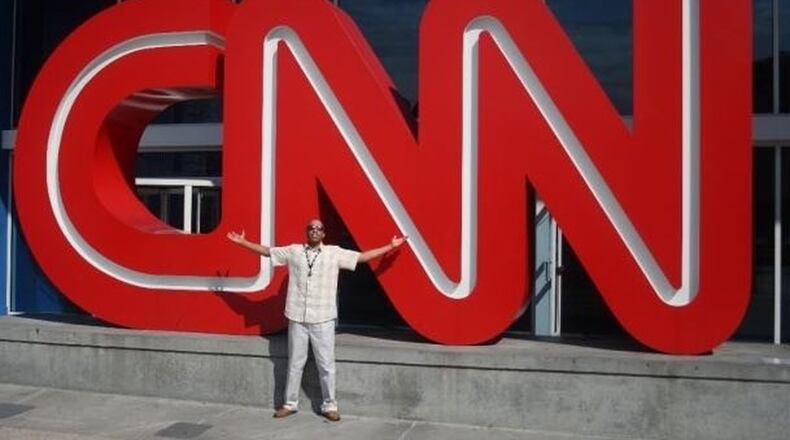The lawsuit filed by a former employee against CNN is pretty much a routine racial discrimination claim.
Omar Butcher, a black man who worked as an associate producer, says he was passed over several times by less-experienced white employees. CNN repeatedly used the term "denied" in its legal response.
I don't know why Butcher's talents and ambitions went unrequited at the Atlanta-based network, nor do I know the inner workings of CNN's human resources department.
But there was one claim in his suit that caught my eye: Butcher says he was discriminated against by co-workers swearing in the newsroom. Butcher says he is a devout Christian and “became increasingly troubled by certain of his team members’ frequent use of profane language.”
In particular, he didn’t like them taking the Lord’s name in vain and says he emailed them asking them to knock it off. Instead, he said, some doubled down on their GD-ing or stepped up how often they exclaimed “Jesus Christ!” as a way to stick it to him.
The charge kind of shocked me in a what-is-this-world-coming-to way. No swearing in the newsroom? What? Will they forbid drinking in taverns next?
I told a CNN newsroom employee about the claim in the lawsuit.
“Oh, God,” said the employee, who wanted to keep a low profile. “He must be talking about 20 years ago. This place is so corporate now. There’s no swearing in the newsroom.”
The employee thought about it for a minute before adding, “He worked in a (f-word) newsroom. C’mon!”
For 35 years, I’ve toiled in newsrooms and found them to be irreverent, skeptical and dyspeptic, all with a roguish, off-colored outlook of the world. The sense of humor and discourse is somewhere between that of a police force and a loading dock, albeit with a literary tilt.
Profanity is a tradition, almost a ritual. You remember Perry White, the editor of the Daily Planet, where Clark Kent (aka Superman) worked? His catchphrase was “Great Caesar’s ghost!”
Except he really wasn’t referring to the deceased Roman ruler. What he really meant was something that could get him sideways with a plaintiff’s attorney.
I know, things have changed since the days when grumpy, chain-smoking white men bellowed out orders to cub reporters and girl Fridays. Newsrooms and offices in general have been sanitized because of changing social mores, diversity — and the threat of litigation.
Most people now have largely gotten through their thick skulls that sexual harassment and racial discrimination are taboo, and businesses have gotten better at addressing those pathologies. So attorneys are seeking other events that create hostile workplaces because humans are limitless in their capacity to offend and to take offense.
Amanda Farahany, an Atlanta attorney in employment law, turns away 97 percent of potential clients. She said the offending conduct must be “severe or pervasive toward a protected class” (for instance, sexual, racial and religious discrimination cases).
Cursing, in and of itself, would be a difficult thing to prove as legally hostile. “The courts say they are not the protector of the workplace … The courts say there are things you have to deal with,” Farahany said.
But, she said, if added to other alleged discrimination — for instance, a racial allegation — then maybe it catches on with a jury, she said. Or it catches a company’s attention enough for that company to write a big check.
Mike Haberman, a human relations consultant in metro Atlanta, said employers can banish or limit cursing and should be uniform in enforcement.
But people vary on what might be considered offensive. Is it good-natured ribbing or hostile?
“Much of it is in the eye of the beholder,” Haberman said. For instance, take an office with lots of verbal give-and-take. “Most of you get used to that. But what if you have someone new and they have a different outlook? One person can change the dynamics of the workplace.”
Millennials, he has found, are more likely to swear, something confirmed by a survey last year by Wrike, a project management software company. That survey found that 66 percent of millennials swear at work compared to 54 percent of Gen Xers or baby boomers. Whether it’s because people mellow with age or it’s a generational coarsening was not explained.
One thing that’s certain, and shrinks will back this up: Swearing is cathartic. In a pressure-filled environment — such as the news business, where deadlines always loom — a well-timed epithet or a stinging string of invective can feel better than a coffee break.
But sadly, swearing in the newsroom is going the way of the typewriter as bosses try to emulate the atmosphere of insurance or accounting offices.
» RELATED: Class-action lawsuit against CNN, Turner
» RELATED: Lawsuits accuse CNN of racial discrimination
A couple of years ago, the editor of the York Daily Record in Pennsylvania wrote a memo saying: “I want to remind all employees that cursing is not appropriate in the work environment. It’s not appropriate in the office and it’s not appropriate when you are representing us elsewhere.”
If I may jump in, everyone already knows this. It’s like restaurant employees, who can curse up a store in the kitchen and then walk out front and be all polite to customers.
But I’ll let the do-good editor continue: “I know that newspapers have had a salty history and culture. And I know that we all will slip from time to time. Still, I believe we can express ourselves adequately without the use of profanity.
“Let’s clean up our language and make this a workplace that anyone can feel comfortable in.”
A week before this missive, she wrote another memo: “If your New Year resolution is to eat healthy, we’re here to help. Our Healthy Vending machines will be installed on Thursday! No more Mountain Dew. No more Snickers bars.”
No Snickers? No swearing? Someday this job will feel like real work.
About the Author
Keep Reading
The Latest
Featured





